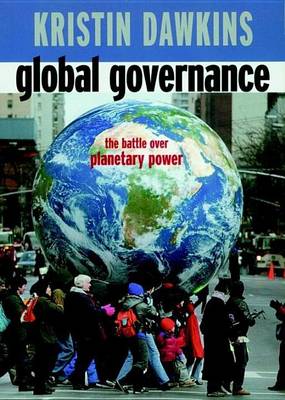Open Media
3 total works
In Global Governance, policy analyst Kristin Dawkins offers a refreshingly hopeful and astute roadmap towards a democratic future, framing the respective roles and accomplishments of corporations, governments, and citizen activists in light of the day-to-day needs of communities around the world. Written with an eye to the realities of power, Global Governance explores the origins and current state of play in the major global institutions, the rising dominance of global corporations and the growing wealth of the world’s political elite. In describing the impacts of international trade, aid and development loans on Southern economies and communities, Dawkins carefully explains the way governmental policies overseas become instruments of coercion in the context of globalization.
Writing with a passionate commitment to justice and democracy, Dawkins points out that the U.S. government is becoming increasingly hostile to the UN – even though many of the UN’s institutions and treaties were designed to address poverty and the other problems created by globalization. At a time when the UN’s very survival is being questioned, Global Governance is an urgent call to revitalize multilateralism and to build powerful new tools for democratic global governance.
Writing with a passionate commitment to justice and democracy, Dawkins points out that the U.S. government is becoming increasingly hostile to the UN – even though many of the UN’s institutions and treaties were designed to address poverty and the other problems created by globalization. At a time when the UN’s very survival is being questioned, Global Governance is an urgent call to revitalize multilateralism and to build powerful new tools for democratic global governance.
v. 2
Despite technological advances, an alarming number of people in the world go hungry. Even more chilling is the fact that in the future that number will likely increase. In this book, Kristin Dawkins discusses the international policies that are shaping this future, including those that govern the genetic engineering of plants. Dawkins shows how a diversified gene pool is crucial to food production - and how corporate control of the gene pool threatens our collective security.
Behind these issues lies the specter of globalization - transnational corporations freely exploiting the resources and consumers of the world while political power shifts to remote international institutions strictly dedicated to commerce. Dawkins challenges those in power to develop global systems of political discourse in the public interest and shows how each one of us can make a difference.
Behind these issues lies the specter of globalization - transnational corporations freely exploiting the resources and consumers of the world while political power shifts to remote international institutions strictly dedicated to commerce. Dawkins challenges those in power to develop global systems of political discourse in the public interest and shows how each one of us can make a difference.


